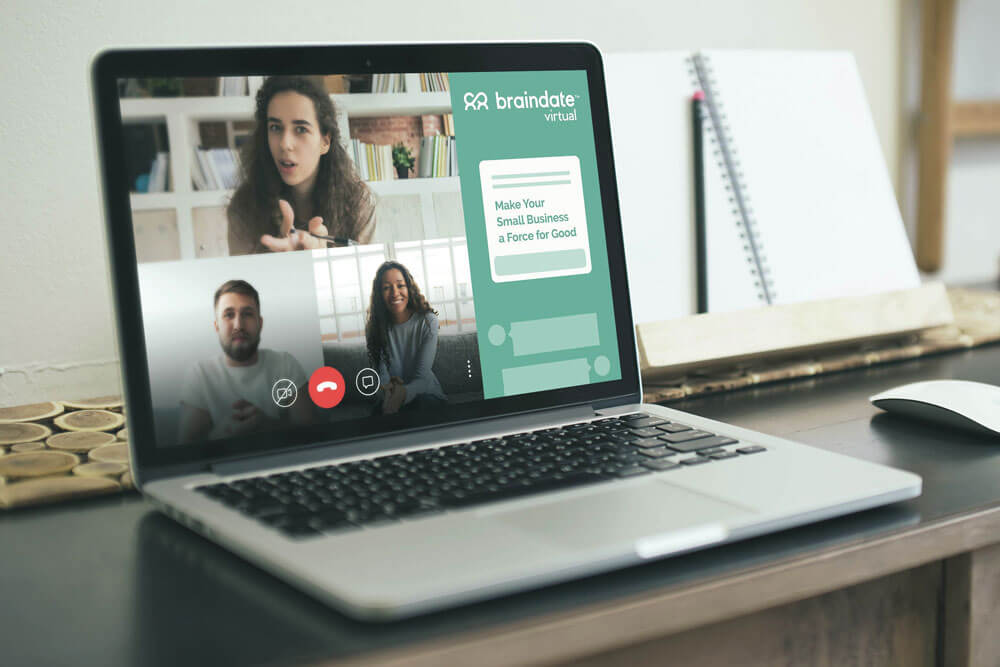
E-180 hosted a daylong event on an all-virtual platform on April 2.
Christine Renaud, CEO of the Montréal-based company e180 and creator of the peer-to-peer learning platform Braindate, talks about the opportunities for transformation embedded in this moment, and habit that’s will help you thrive.

Christine Renaud
We’ve all scrambled to find our ground in this new normal. Here is what it looked like for us at e180: Watching all our clients having to cancel their in-person events and losing all of our 2020 revenues over the course of five business days, and then launching a new virtual product within three weeks. Over the course of those 21 days, I’ve witnessed fear and sadness, of course, but also resilience and enthusiasm as we’ve come together to build something new.
On April 2, we launched e180’s peer-learning Braindate platform as a virtual event, Navigating Uncertainty: An #EventProfs Huddle, in hopes that it would be an opportunity for event professionals to come together and brainstorm, exchange resources, support one another, and reimagine what the future of remarkable event experiences would look like.
It was more successful than we could ever have imagined. Nearly 800 people registered for the event, which ran for 12 hours, in order to accommodate client time zones that stretched from Melbourne to San Francisco. Participants brain-dated away for hours, and by the end of the day, had built more than 700 connections through one-on-one and group braindates.
Based on our experience, we’ve identified four misconceptions about what it takes to create learning experiences where humans connect, reset, and grow — and four new habits that will support virtual events.
Misconception #1 Learning means storing information until you are ready to use it.
A lot of our inspiration for the delivery of content during events comes from the way we learned at school. Because we believe that more content means more value, we bombard our participants with lectures, each one designed to be more innovative than the next. (And, if we are lucky, we might even have a futurist for a keynote speaker.)
But our attendees’ minds aren’t empty buckets waiting for us to fill them. In other words, most of those insights will be lost if your participants are not looking for the information you are providing.
New habit #1 Help your participants define their intention for your event, and then help them choose the content that will propel them on their journeys, right now.
Misconception #2 Place people in a room and let the magic of serendipity do the rest.
That seldom creates good experiences in the context of live events, and it’s even less likely to happen on a Zoom call. While it can be fun to be sent into a Zoom room to chat with random people, a bit of intentionality goes a long way.
New habit #2 Uncover people’s burning questions in advance and lead small groups through the process of working together on a common challenge.
Misconception #3 Great virtual events and face-to-face events look alike — and are the same length.
It is hard for people to sit for many hours at a time, even in a room surrounded by hundreds of others. Since our participants don’t have to travel to be under the same roof, there is no reason why we should pack three days with virtual content and expect them to sit through hours of lectures. Quite the opposite.
New habit #3 Deliver the right experience just-in-time through new short rituals, which can even be built up over the course of many weeks.
Misconception #4 A great event is mostly built on the best experts.
The internet is full of great content, and we are now directly competing with people’s own ability to make their content choices themselves. Curation therefore is probably not where you should invest most of your time. Especially in the context of this pandemic, people crave celebration, belonging, meaning, and guidance much more than information. What’s truly difficult for individuals to accomplish by themselves is to gather and nurture and a great community.
Michèle Robinson, e180’s head of learning experience, attended the first all-virtual CMX Global Connect for community managers in late April, and had this takeaway to share: “The world of community managers and event managers is colliding now more than ever. CMX set the bar high in terms of creating and hosting an engaging virtual event that felt like a community gathering. They nailed the social component, the feeling of being together while hearing from inspiring thought leaders, by choosing a platform that allowed people to live chat while content was streaming. And then, importantly, they had a team of volunteers, and the company founder, actively participate in the chat discussions. CMX also actively hosts and engages people in their Slack space year-round, with a channel dedicated to the event.”
New habit #4 Design your event in collaboration with your community managers, or community managers in your industry if you don’t have a dedicated team of your own.
This is a rough time for all of us, and I want to take a moment to acknowledge the incredible resilience and courage I have seen our community displaying. I want to salute your ability to think creatively, find solutions to problems that threaten your stability, all the while juggling your kids, mourning your social life, and seeing to everyone’s mental health. We are all experiencing a transformation like we may never see again in our lifetimes, and transformation is often painful. But I wish for you and your important ones to find the light and the transformation that will make you feel that the pain wasn’t in vain.
Meeting professionals are invited to participate in PCMA Braindate: Future Event Scenarios on Wednesday, May 27, between 9 a.m. and 5 p.m. CDT. PCMA is partnering with e180 for the drop-in forum. Register at PCMA’s events page.
Christine Renaud, founder of e180, is a public speaker and author. She earned a master’s degree in education from the Harvard Graduate School of Education and serves as an adviser to the Harvard Innovation Lab. She’d love to hear from you at christine@e180.co or @christinerenaud on Twitter.
